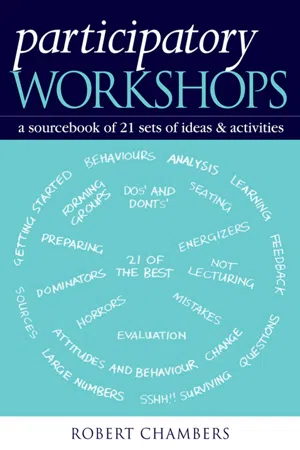
- 236 pages
- English
- ePUB (mobile friendly)
- Available on iOS & Android
eBook - ePub
About this book
This sourcebook is for all who work with others on participatory learning and change. Written in a spirit of critical reflection and serious fun, it provides 21 sets of ideas and options for facilitators, trainers, teachers and presenters, and anyone who organises and manages workshops, courses, classes and other events for sharing and learning ideas. It covers topics such as getting started, seating arrangements, forming groups, managing large numbers, helping each other learn, analysis and feedback, dealing with dominators, evaluation and ending, coping with horrors, and common mistakes.
Frequently asked questions
Yes, you can cancel anytime from the Subscription tab in your account settings on the Perlego website. Your subscription will stay active until the end of your current billing period. Learn how to cancel your subscription.
No, books cannot be downloaded as external files, such as PDFs, for use outside of Perlego. However, you can download books within the Perlego app for offline reading on mobile or tablet. Learn more here.
Perlego offers two plans: Essential and Complete
- Essential is ideal for learners and professionals who enjoy exploring a wide range of subjects. Access the Essential Library with 800,000+ trusted titles and best-sellers across business, personal growth, and the humanities. Includes unlimited reading time and Standard Read Aloud voice.
- Complete: Perfect for advanced learners and researchers needing full, unrestricted access. Unlock 1.4M+ books across hundreds of subjects, including academic and specialized titles. The Complete Plan also includes advanced features like Premium Read Aloud and Research Assistant.
We are an online textbook subscription service, where you can get access to an entire online library for less than the price of a single book per month. With over 1 million books across 1000+ topics, we’ve got you covered! Learn more here.
Look out for the read-aloud symbol on your next book to see if you can listen to it. The read-aloud tool reads text aloud for you, highlighting the text as it is being read. You can pause it, speed it up and slow it down. Learn more here.
Yes! You can use the Perlego app on both iOS or Android devices to read anytime, anywhere — even offline. Perfect for commutes or when you’re on the go.
Please note we cannot support devices running on iOS 13 and Android 7 or earlier. Learn more about using the app.
Please note we cannot support devices running on iOS 13 and Android 7 or earlier. Learn more about using the app.
Yes, you can access Participatory Workshops by Robert Chambers in PDF and/or ePUB format, as well as other popular books in Economics & Development Economics. We have over one million books available in our catalogue for you to explore.
Information
Part 1 Brief Basics
DOI: 10.4324/9781849772136-2
21 Dos
DOI: 10.4324/9781849772136-2
If you are repeating what you did two years ago, is something wrong?
When in doubt,
- Do something new
- Be of good heart
- Fail forwards
- Bounce back
- Celebrate learning
and
| • experiment | • adapt |
| • innovate | • combine |
| • invent | • vary |
| • improvise | • sequence |
| • dare | • reflect |
| • risk | • self-critique |
| • seek | • change |
| • explore | • share |
| • discover | • spread |
| • collect | • enjoy |
and
- make your own list
21 Questions when Preparing for Participatory Workshops and Learning
DOI: 10.4324/9781849772136-3
A Skeleton Checklist
1 Why?
What is the purpose? Who determines it? What experience, sharing, analysis, learning or other end is sought?
2 How Does it Fit?
How does the workshop fit into longer-term processes of learning and change? If there are no such longer-term processes, should you undertake it at all? Or should you negotiate with the sponsors for commitment to make it fit?

3 Who and How Many?
Who will the people be? How should they be selected, and against what criteria? How many should there or will there be?
4 What Expectations?
What will they expect? How can you find out?
5 How Participatory?
What sort of process? How participatory can and should it be? How much can participants do themselves?
6 What is Your Part?
What is your role and contribution? Trainer, facilitator, co-learner…?
7 Who Else?
Who else could, should or will help, take part or co-facilitate?
8 Where?
What venue should be sought, against what criteria?
9 When?
When should it be? How long should it take? What should the timetable be for preparations?
10 Finance
What will it cost and how will it be paid for? What allowances, if any, will participants expect and receive, and who will pay for these?
11 Programme
With whom, where, when and how should the programme be planned? Who should be consulted?
12 Languages
What languages will be used? Who may be marginalized by language? What can be done about it? Are interpreters needed?
13 Logistics
Who – not a facilitator and not a participant – will handle travel and logistics? Are extra support staff needed?
14 Materials and Equipment
What will be needed – materials, equipment, transport?
15 Participants' Preparation
What should be sent to participants in advance? What should they do in advance?
16 Local Liaison
Do arrangements need to be made with a local administration, local communities or other organizations? Who should make these?
17 Outputs
What outputs will there be? A written record? A report? A video? Notes? If so, who will be responsible and what will be the later value, circulation and use of the output(s)?
18 Follow-up
What follow-up can and should there be? With participants? With their organizations? Locally, with administration, communities and organizations?
19 Your Preparation
What do you need to do to prepare? When and how can you do this? What help do you need?
20 Flexibility
What is best left unplanned?
21 What is Missing from This List?
What else should you be thinking about and preparing for?
21 PRA/PLA Behaviours1
DOI: 10.4324/9781849772136-4
PRA originated in East Africa and India as Participatory Rural Appraisal. It has been described as a family of approaches, behaviours and methods for enabling people to do their own appraisal, analysis and planning, take their own action, and do their own monitoring and evaluation. It often involves people in groups developing their own visuals such as diagrams and maps, drawing on the ground with sticks or on paper with pens, and using counters like beans, seeds or stones. Following the lead of Pakistan, the letters PRA have increasingly been taken to stand for Participatory Reflection and Action. Other practitioners describe what they do as Participatory Learning and Action (PLA) to stress inclusive methodological pluralism. PRA/PLA has spread to many countries and from South to North, with applications in many domains.

This is one person’s list of behaviours for PRA/PLA. They are derived from fieldwork and apply also to participatory workshops, training and helping one another to learn.
Why not make out your own list of dos and don’ts before you read mine?
None of these behaviours is an absolute. There are occasions for doing the don’ts and not doing the dos. The point is to ask whether we do the don’ts too much and don’t do the dos enough. Good facilitat...
Table of contents
- Cover Page
- Half-Title Page
- Dedication
- Title Page
- Copyright Page
- Table of Contents
- Acknowledgements
- Glossary of Terms and Meanings
- On this Sourcebook
- Introduction
- PART 1 BRIEF BASICS
- PART 2 BEGINNING, MIDDLE AND END
- PART 3 MESSING UP
- PART 4 GROUPS, SEATING AND SIZE
- PART 5 ANALYSIS AND LEARNING
- PART 6 BEHAVIOUR AND AWARENESS
- References
- A Note on Equipment, Materials and Furniture
- Subject Index
- Index of Named Activities